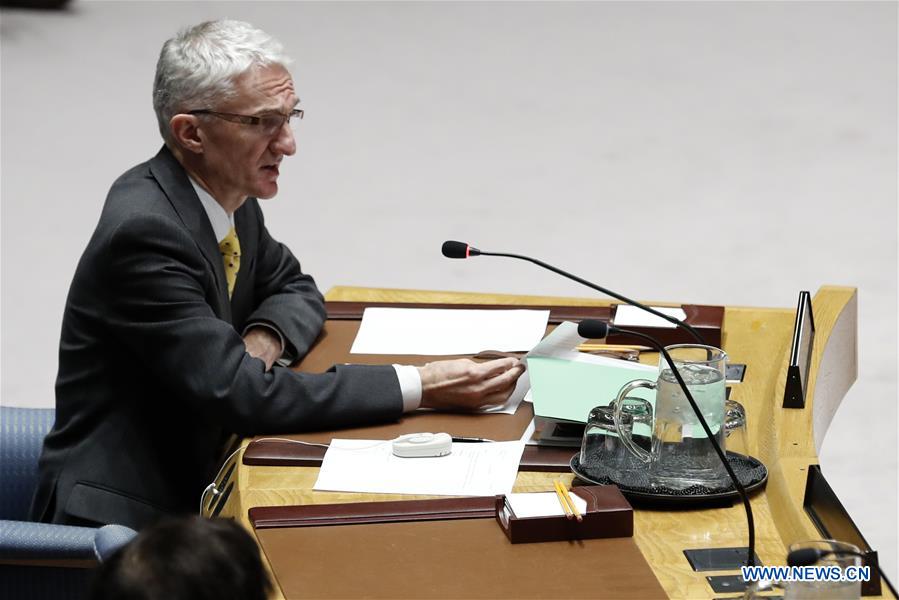
United Nations Under-Secretary-General for Humanitarian Affairs and Emergency Relief Coordinator Mark Lowcock briefs the Security Council on the situation in Yemen, at the UN headquarters in New York, Jan. 9, 2019. The UN humanitarian chief on Wednesday called for progress on the humanitarian front in Yemen following the implementation of a ceasefire that largely restored Hodeidah to calm. (Xinhua/Li Muzi)
UNITED NATIONS, Jan. 9 (Xinhua) -- The UN humanitarian chief on Wednesday called for progress on the humanitarian front in Yemen following the implementation of a ceasefire that largely restored Hodeidah to calm.
"I cannot yet report you that the wider humanitarian situation in Yemen is any better. It remains catastrophic," UN Under-Secretary-General for Humanitarian Affairs Mark Lowcock told the Security Council.
While acknowledging the important progress the political track deserves full and continuing support, he stressed, "It does not itself feed a single starving child."
He urged more and faster progress on "all the humanitarian elements of your resolution to make any practical difference to their lives."
The Yemeni government and the Houthi rebels agreed in Sweden last month to the ceasefire for rebel-held Hodeidah and its three ports, after the futile operation by Saudi-led coalition, backing the government, to capture it.
The Security Council adopted Resolution 2451 to endorse the Stockholm agreement.
As the port of Hodeidah handles about 70 percent of the imports and aid to the poorest Arab country, fighting in and around it has exacerbated the humanitarian situation of Yemen, which is on the brink of famine.
In his briefing to the Security Council, Lowcock reaffirmed more than 24 million Yemenis need humanitarian assistance, about 80 percent of the population, and that nearly 10 million Yemenis are just one step away from famine.
He said that in December, the World Food Programme (WFP) reached a record number of 9.5 million people with emergency food assistance, and that in the next few months, it will expand operations to reach 12 million people a month.
In addition, agencies are preparing for large-scale returns to Hodeidah, he said. "Altogether, operations in Yemen this year will, if funding is available, reach 15 million people."
In terms of access to aid, following the Stockholm agreement, he said, regaining access to the Red Sea mills and several humanitarian warehouses, as an immediate objective of the deal, "has not yet happened."
"It does need to happen quickly," he urged, detailing "enough grain for 3.5 million people has now been sitting unused, possibly spoiling, for nearly four months in the mills."
Moreover, the WFP has nearly 500 containers stuck in Aden port, he said. "In some cases, they have had to re-route cargo via Salalah in Oman and then overland into Yemen at greater cost and risk."
"I hope the government of Yemen, de-facto authorities and other stakeholders will take all steps necessary to ensure the smooth, unimpeded flow of commercial and humanitarian imports through all Yemeni ports," he said.
Also, in December, commercial fuel imports through Hodeidah and Saleef ports were the highest since August 2017, marking a significant improvement, Lowcock said, adding the number of clearance requests to enter the two ports also more than doubled in the month.
However, commercial food imports in December plummeted to 163,000 tons, the lowest recorded since July 2016, he said. "Overall, average monthly commercial food imports are now 25 percent lower than a year ago."
With regard to the Yemeni economy, the International Monetary Fund has estimated the exchange rate is like to slide to more than 700 rial to the dollar in 2019. Lowcock said he thinks as Yemen imports nearly all its food, fuel and medicines, regular and predictable injections of foreign currencies are needed to keep its exchange rate at an affordable level.
The UN humanitarian chief expects the 2019 Humanitarian Response Plan, which will be finalized in weeks, to require some 4 billion U.S. dollars, half of which will be for emergency food assistance alone.
He called on donors to announce generous funding at a pledging conference to be convened by the secretary-general in Geneva in February.
The Yemeni conflict started in 2014 when the Houthi rebels took the capital Sana'a. The Saudi-led Arab coalition, supporting the government, has been fighting the Houthis since 2015.
Several rounds of peace negotiations have been held between the warring parties under the auspices of the UN. The latest round of talks in Sweden marks the biggest breakthrough so far in the UN-led effort to resolve the conflict.















